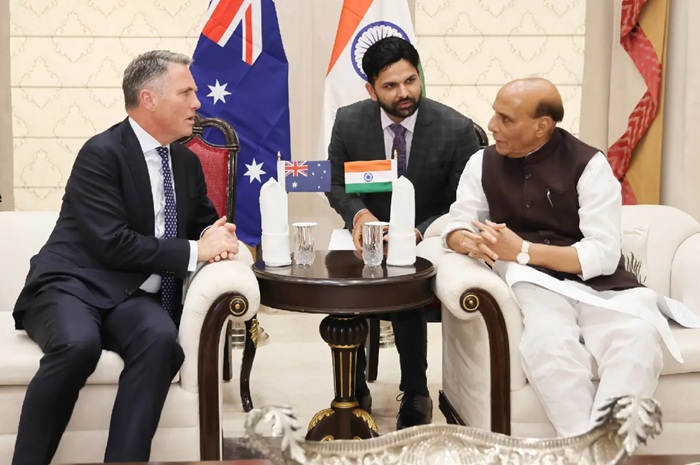
India has cautioned Australia against any engagement with the Pakistani military, as it may lead to China getting access to its defence technology. The matter came up during the discussion between Indian Defence Minister Rajnath Singh and Australian Defence Minister Richard Marles on Wednesday in New Delhi. The discussions come against the backdrop of Australia’s own anxieties over China’s expanding military presence, including recent live-fire naval drills in the Tasman Sea in February 2025.
Australian Deputy Prime Minister and Defence Minister Richard Marles is currently visiting India as part of a four-nation trip to boost Canberra’s security cooperation with South and Southeast Asia, including the Maldives, Sri Lanka, and Indonesia.
During the talks, both ministers strongly condemned the terror attack in Pahalgam and expressed their deepest condolences to the families of the victims.
In a statement, India’s defence ministry said Defence Minister Singh underscored “India’s right to respond in self-defence against cross-border terrorism” and described New Delhi’s actions against Pakistan as “measured, non-escalatory, proportionate, and responsible.” He also said that India would give a robust response to any future terror attacks, dismissing Pakistan’s “nuclear blackmail”.
Delhi has sought Canberra’s support both bilaterally and at multilateral fora such as the IMF, World Bank, FATF, UN to expose Pakistan’s support to cross-border terror. The FATF meeting will be taking place next week, and India plans to present a case for Pakistan’s greylisting.
Pakistan has been on the FATF’s grey list in the past over worries that investments in the country might go to terror financing.
Richard Marles is the first Quad defence minister to visit India since Operation Sindoor, which saw India launch precision strikes on terror camps in Pakistan in the aftermath of the Pahalgam terror attack. The terror attack in India by Pakistan-trained terrorists claimed the lives of 25 Indians and one Nepali national. The Resistance Front (TRF), an offshoot of Lashkar-e-Taiba (LeT), claimed responsibility for the attack.
During the Delhi talks, focus was on Indian participation in Talisman Sabre, a multinational military exercise led by Australia and the United States, which will take place from 13th July to 4th August, on maritime security and maritime domain awareness, industry collaboration, and joint projects in defence, science, and technology.
In a breakthrough in defence ties, both countries have signed a submarine detection technology project, or what is known in technical terms as towed array sonar, an underwater detection technology. India has proposed ship maintenance for Australian vessels.
With a focus on the Pacific, India will also, for the first time, observe the Australia-Papua New Guinea exercises, Puk Puk. The annual exercises between the Australian Defence Force (ADF), primarily the Army’s 3rd Combat Engineer Regiment, and the Papua New Guinea Defence Force (PNGDF) Engineer Battalion focus on enhancing cooperation, building relationships, and improving infrastructure while developing engineering and trade skills. The United Kingdom and New Zealand also participate in these exercises. The exercises help Papua New Guinea’s infrastructure needs and defence force engineering ties.
Another key focus of the talks was on India’s Khalistan concerns. In the past, a number of incidents of vandalisation of Hindu temples have been reported in Australia by Khalistani elements. In 2023, a so-called Khalistani referendum was also conducted by these elements, which witnessed clashes. Australia has condemned incidents of violence involving Khalistani elements.
The Australian Deputy Prime Minister Marles also called on Prime Minister Narendra Modi earlier in the day. A readout from the Indian side said both countries reaffirmed that “the shared vision for a stable, secure and prosperous Indo-Pacific continues to guide the bilateral collaboration.” (WION)
